中国科技大学材料合成化学PPT(1-1) Introdution (b-w)(1)
- 格式:pdf
- 大小:4.00 MB
- 文档页数:51
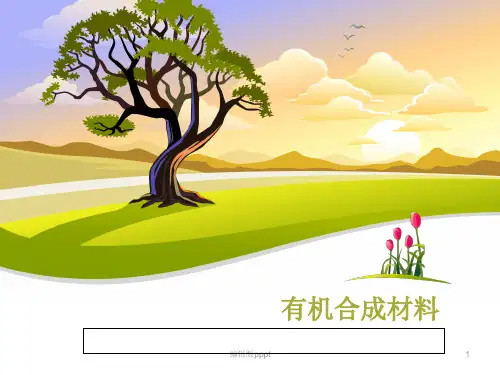
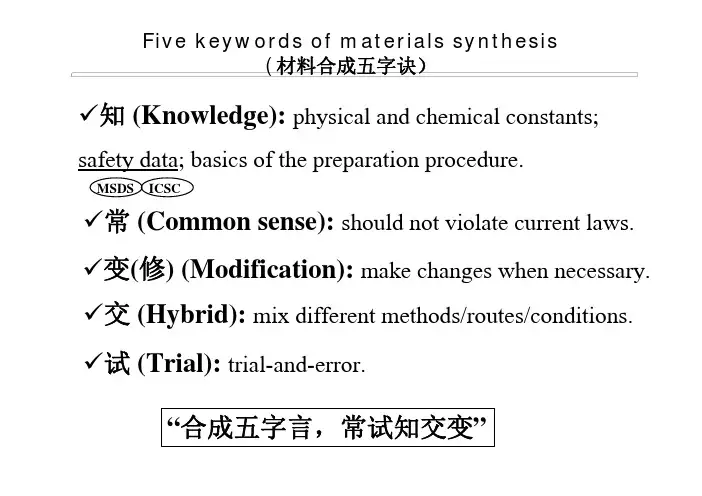
Microwave plasma chemical vapor depositionOxygen-conduscting Bi2O3What is Solid State Ionics?YBa 2Cu 3O 7-δ(YBCO) synthesis Pyrolysis“Unobtainium”“Hallelujahmountains”“bioluminescence”PyrolysisComplexationCitrate-methodMetal ion complex(+ammonium nitrate)Evaporation(viscosity)PyrolysisCalcination葡萄糖酸盐3甘氨酸High Tc superconductor vs. ITER ITER: International Thermonuclear Experimental Reactor ITER is designed to produce approximately500 MW of fusion power sustained for up to1,000 seconds by the fusion of about 0.5 g ofdeuterium/tritium mixture in itsapproximately 840 m3reactor chamber.Surface: 5778KCore: 15.7x106KMicrowave CVD for YBCO films 陈春华, 彭定坤等,硅酸盐通报-1990年2期,p.62-65.CIGS器件结构衬底载气溶液芯片60μmLa1-x Sr x CoO3-d films by sol-gel methods Aqueous sol-gelto La1-x SrxCoO3-δfilmPolymeric sol-gelto La1-xSrxCoO3-δfilm380μm10 祄24μm5μmP.D. Yang (USTC 1993. UC Berkeley), Adv. Func. Mater. 12 (2002) 323.Cure & pyrolyze3600ºF = 1982ºCCosmos-1, June 21, 2005 (Failed)(The world's first solar sail spacecraft )Diameter: 30m, Area: 600m2100kgMylar: Biaxially-oriented polyethylene terephthalate“丹炉九还掷千金”([明]凌蒙初)卷十八丹客半黍九还富翁千金一笑破布衫巾破布裙,逢人惯说会烧银。
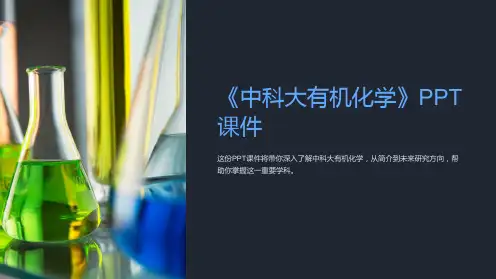

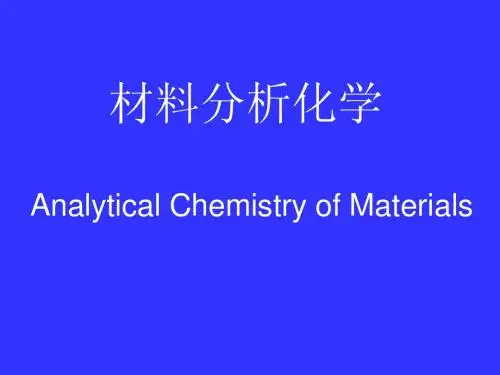
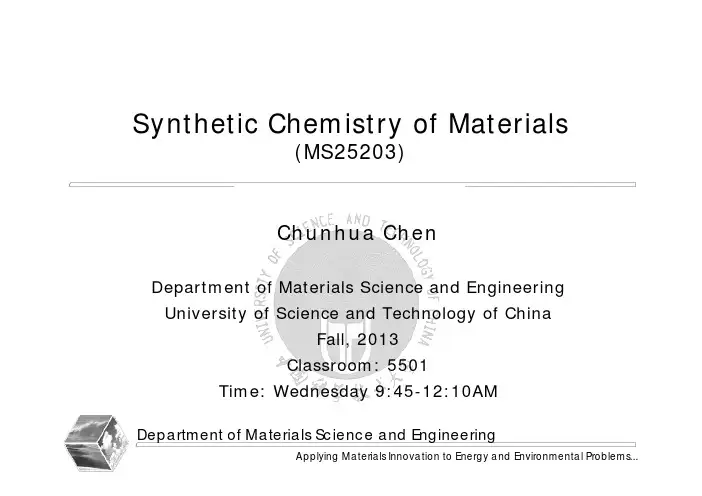
Chunhua ChenDepartment of Materials Science and Engineering University of Science and Technology of ChinaFall, 2013Classroom: 5501Time: Wednesday 9:45-12:10AM Department of Materials Science and Engineering-Nature 443, 1-2(7 September 2006)“12位华人当选全球顶尖化学家中国科大校友占一半”“全球排名前5位材料科学家中,中国科大校友独占其四”Xia YN (35, 4)Lin WB (54)Yang PD (10, 1)Duan XF (41, 20)Sun YG (61,5)Yin YD (55, 2)97859611313394142151218225050100150200250选课人数'03'04'05'06'07'08'09'10'11'12学年材料合成化学课程沿革(续)2006-:主要参考书增加了徐甲强等编著《材料合成 化学》和Ulrich Schubert, Nicola Husing著《Synthesis of Inorganic materials》 2007-:加入参观部分制备技术环节(主要参观晶体 生长和静电喷雾沉积),由姚连增教授和杨萍华高工负 责现场讲解。
2008-:姚连增教授讲授本课程“晶体生长”一章;入 选研究生示范课程建设。
2009-:先后获批中科大校级、安徽省省级研究生精 品课程。
2012 -:获安徽省省级质量工程教学成果一等奖。
本课程是中科大材料系第一门省级精品课程,也是系里最 早的一门网络课程!Professors of this courseProf. Chunhua Chen: responsible for most of the chaptersDr. Louis Winnubst: (visiting prof. from Univ. Twente, The Netherlans) responsible for “Microstructures and processing of ceramics” Prof. Lianzeng Yao: responsible for “Crystal growth”Contents of this course1. 2. 3. 4. 5. 6. 7. 8. 9.Introduction (3 class hours) Fundamental theories for materials synthesis (3) Metallic materials syntheses (6) Polymeric materials syntheses (8) Chemical syntheses and processing of ceramic materials (9) Fabrication of thin films (6) Crystal growth (6) Syntheses of porous materials (3) Special topic 1: Pechini’s method to ceramic powders (3) Special topic 2: Electrostatic spray deposition of thin films (3) Special topic 3: Other synthesis techniques (3) Students group report session (7)10. 11. 12.About the professor: Chunhua Chen81-86: Solid Oxide Ionic Conductors (Bi2O3-based) @ USTC, China ( B. Sc.) 86-89: High Tc Superconductors (YBCO and Bi-based) @ USTC, China (M. Sc.) 89-92: Semiconducting gas sensors (SnO2- and Fe2O3-based) @ USTC, China (Lecturer) 92-94: Oxygen-permeable dense membranes (LaSrCoO-based) @ University of Twente, Netherlands (Research fellow) 94-98: Thin-film components for Li-ion batteries (many) @ Delft Technology University, Netherlands (Ph. D.) 98-01: High power Li-ion batteries for electric vehicles (many) @ Argonne National Laboratory, USA (Postdoc) 01-02: High power Li-ion batteries for electric vehicles (many) @ Argonne National Laboratory, USA (Staff scientist) 02-present: High performance Li-ion batteries and thin-film technology @ USTC, China (Professor)What is SCIENCE?Science “scientia” The knowledge that is most respected.Knowledge DomainFundamentalsLanguageMathematicsLogicSecondaryScienceHumanitiesAstronomy LifeBiology PhysicsChemistry SocialEarth VisualThe artsPhilosophyTheologyAnthropology Economics History Politics Psychology Law EducationLiterature Dance Music ArtBibliology ( 圣经论) Theology (神论) Christology (基督论) Penumatology (圣灵论) Harmatiology ( 罪论) Soteriology (救恩论) Ecclesiology (教会论) Angeolology ( 天使论) Eschatology (末世论) Teleology (目的论) Pastorology (教牧论)What is SCIENCE?The Three Levels of human The Six Levels of Thought thoughtEvaluation Synthesis Analysis Application Comprehension Knowledge ③ FantasyThe final and most distant level of thought. Thoughts here are random, often nonsensical. Many times these thoughts encompass the results of your actions, since no one consciously realizes what their actions may mean.(by C.S. Lewis in 《The Screwtape Letters》)② IntellectThoughts on this level tend to be conscious thoughts, conscious decisions. These thoughts can be anything at all, and don't necessarily influence you in any great way.① WillThe first primary level. At this level, everything is real, and factual. The thoughts on this level influence your daily life and govern all of your actions. Also, thoughts here are usually subconscious, influencing you without you even knowing it.What is SCIENCE?科学是关于自然界、人类社会以及人 自身的规律的概念、原因、方法和观念。
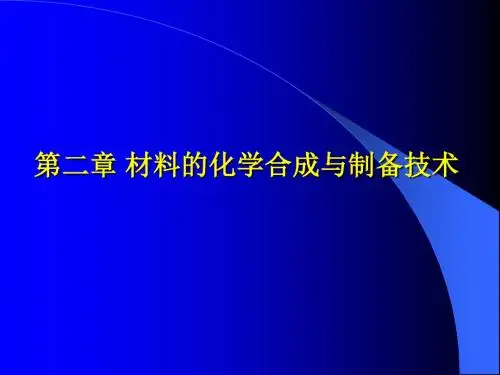
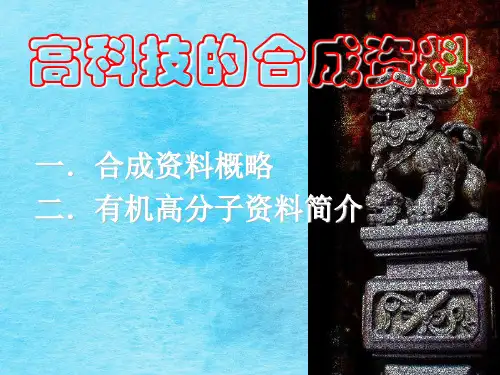
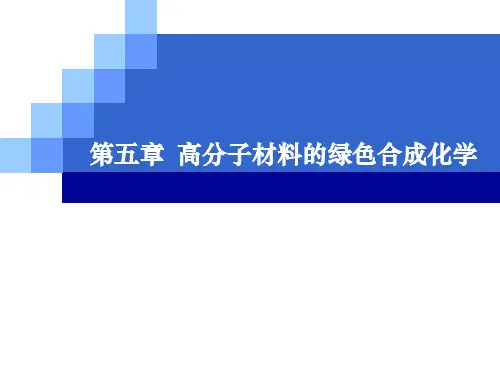
Chunhua ChenDepartment of Materials Science and Engineering University of Science and Technology of ChinaFall, 2013Classroom: 5501Time: Wednesday 9:45-12:10AM Department of Materials Science and Engineering-Nature 443, 1-2(7 September 2006)“12位华人当选全球顶尖化学家中国科大校友占一半”“全球排名前5位材料科学家中,中国科大校友独占其四”Xia YN (35, 4)Lin WB (54)Yang PD (10, 1)Duan XF (41, 20)Sun YG (61,5)Yin YD (55, 2)97859611313394142151218225050100150200250选课人数'03'04'05'06'07'08'09'10'11'12学年材料合成化学课程沿革(续)2006-:主要参考书增加了徐甲强等编著《材料合成 化学》和Ulrich Schubert, Nicola Husing著《Synthesis of Inorganic materials》 2007-:加入参观部分制备技术环节(主要参观晶体 生长和静电喷雾沉积),由姚连增教授和杨萍华高工负 责现场讲解。
2008-:姚连增教授讲授本课程“晶体生长”一章;入 选研究生示范课程建设。
2009-:先后获批中科大校级、安徽省省级研究生精 品课程。
2012 -:获安徽省省级质量工程教学成果一等奖。
本课程是中科大材料系第一门省级精品课程,也是系里最 早的一门网络课程!Professors of this courseProf. Chunhua Chen: responsible for most of the chaptersDr. Louis Winnubst: (visiting prof. from Univ. Twente, The Netherlans) responsible for “Microstructures and processing of ceramics” Prof. Lianzeng Yao: responsible for “Crystal growth”Contents of this course1. 2. 3. 4. 5. 6. 7. 8. 9.Introduction (3 class hours) Fundamental theories for materials synthesis (3) Metallic materials syntheses (6) Polymeric materials syntheses (8) Chemical syntheses and processing of ceramic materials (9) Fabrication of thin films (6) Crystal growth (6) Syntheses of porous materials (3) Special topic 1: Pechini’s method to ceramic powders (3) Special topic 2: Electrostatic spray deposition of thin films (3) Special topic 3: Other synthesis techniques (3) Students group report session (7)10. 11. 12.About the professor: Chunhua Chen81-86: Solid Oxide Ionic Conductors (Bi2O3-based) @ USTC, China ( B. Sc.) 86-89: High Tc Superconductors (YBCO and Bi-based) @ USTC, China (M. Sc.) 89-92: Semiconducting gas sensors (SnO2- and Fe2O3-based) @ USTC, China (Lecturer) 92-94: Oxygen-permeable dense membranes (LaSrCoO-based) @ University of Twente, Netherlands (Research fellow) 94-98: Thin-film components for Li-ion batteries (many) @ Delft Technology University, Netherlands (Ph. D.) 98-01: High power Li-ion batteries for electric vehicles (many) @ Argonne National Laboratory, USA (Postdoc) 01-02: High power Li-ion batteries for electric vehicles (many) @ Argonne National Laboratory, USA (Staff scientist) 02-present: High performance Li-ion batteries and thin-film technology @ USTC, China (Professor)What is SCIENCE?Science “scientia” The knowledge that is most respected.Knowledge DomainFundamentalsLanguageMathematicsLogicSecondaryScienceHumanitiesAstronomy LifeBiology PhysicsChemistry SocialEarth VisualThe artsPhilosophyTheologyAnthropology Economics History Politics Psychology Law EducationLiterature Dance Music ArtBibliology ( 圣经论) Theology (神论) Christology (基督论) Penumatology (圣灵论) Harmatiology ( 罪论) Soteriology (救恩论) Ecclesiology (教会论) Angeolology ( 天使论) Eschatology (末世论) Teleology (目的论) Pastorology (教牧论)What is SCIENCE?The Three Levels of human The Six Levels of Thought thoughtEvaluation Synthesis Analysis Application Comprehension Knowledge ③ FantasyThe final and most distant level of thought. Thoughts here are random, often nonsensical. Many times these thoughts encompass the results of your actions, since no one consciously realizes what their actions may mean.(by C.S. Lewis in 《The Screwtape Letters》)② IntellectThoughts on this level tend to be conscious thoughts, conscious decisions. These thoughts can be anything at all, and don't necessarily influence you in any great way.① WillThe first primary level. At this level, everything is real, and factual. The thoughts on this level influence your daily life and govern all of your actions. Also, thoughts here are usually subconscious, influencing you without you even knowing it.What is SCIENCE?科学是关于自然界、人类社会以及人 自身的规律的概念、原因、方法和观念。
1)科学的核心是规律; 2)科学是关于自然界、人类社会和人自身 三个领域的规律,也就是说科学包括自然 科学和社会科学; 3)科学是关于规律的概念、原理、方法和 观念几个方面的知识体系。
也就是说,科 学不仅仅是传统意义上的知识(概念和原 理),更包括科学方法和科学观念。
What is SCIENCE?科学的特点: 1)符合“奥卡姆剃刀”原则(“如无必要, 勿增实体”)(Entities should not be multiplied unnecessarily); 2 ) 本身是自恰的(self-consistent); 3)可被否证的,不能在任何条件下都 永远正确、不能有任何的修正; 4)有清楚界定的应用范畴; 5) 有可被检验的预测; 6) 在实际上已有了被证实的预测; 7) 结果可被重复。
What is SCIENCE?Advancement of Learning (1605)Francis Bacon (1561-1626)Natural science is split up into physics and metaphysics. The former investigates variable and particular causes, the latter reflects on general and constant ones, for which the term form is used.Facts cannot be collected from nature, but must be constituted by methodical procedures, which have to be put into practice by scientists in order to ascertain the empirical basis for inductive generalizations.[Syllogism]手表定理Justice PrudenceFortitude TemperanceFaith Hope Charityearlier!。